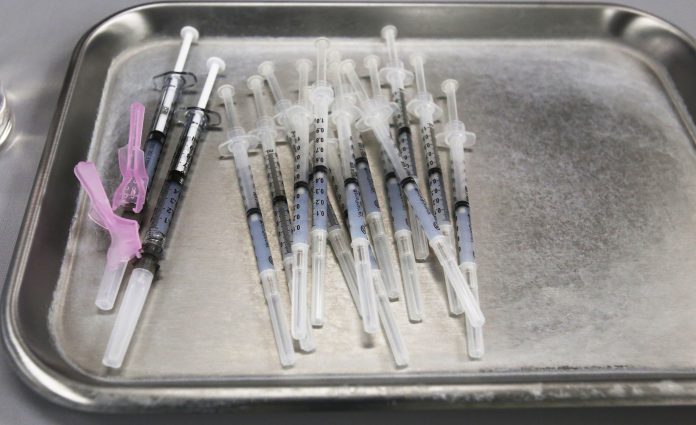SANTA CRUZ COUNTY—At least 5,600 doses of vaccinations for the novel coronavirus have been distributed throughout Santa Cruz County, a number that county health officials at a Friday press conference said has been significantly impacted by plodding distribution from the state.
Overall, the county has received about 16,000 doses of Covid-19 vaccines—both from Pfizer and Moderna. But that is far short of the 29,000 doses needed for the county to finish up the first phase of its vaccination plan, which includes frontline health care workers, several first responders and residents and employees of skilled nursing facilities, among others. Of the roughly 11,000 doses still in the county’s inventory, about 8,000 are squared away as second doses for those who have already received the first shot.
Most frontline employees at local hospitals have received both doses, health officials said Friday, but others in the so-called Phase 1A portion of the vaccination plan have not. That includes many residential care facilities, who have not yet heard when they will receive the vaccine, according to Deputy County Health Officer David Ghilarducci.
Ghilarducci said that is because the vaccine is still in low supply locally, and the number of doses being sent to public health agencies has been limited. Next week the county is expected to receive only 200 doses, Ghilarducci said, making it “an impossible task” to quickly finish off Phase 1A and move on to the much larger Phase 1B, which now includes all people over the age of 65—about 48,000 people in Santa Cruz County—thanks to a mandate from the California Department of Public Health.
Still, Ghilarducci said his earlier prediction that the county would advance into Phase 1B in late January or early February remains an attainable goal. He said many county residents would receive their vaccines from agencies such as the Pharmacy Partnership for Long-Term Care, their health care providers or other smaller health care providers such as Safeway Pharmacies and Doctors on Duty. The county’s allotment of vaccines, he said, would primarily go to residents living in communities disproportionately impacted by the pandemic and will be distributed in clinics such as Salud Para La Gente in Watsonville.
California is lagging behind nearly every other state in the country in its rate of vaccinations. According to statistics compiled by Bloomberg News, California has only administered about 26% of its 3.4 million shots—the average around the country is 36%.
“The bottom line is that we are asking for patience and understanding,” Ghilarducci said. “We certainly understand your anxiety, and we’re actually very happy that many of you are interested in being vaccinated because that is really our path out of this.”
The vaccination woes come as the county is seeing its highest case rates since the start of the pandemic. According to state data, the county had 59 cases per day per 100,000 residents as of Friday, meaning the county, which has a population of roughly 273,000, is seeing more than 160 new Covid-19 cases every day.
Also, some of the county’s “safety net” clinics, County Health Officer Dr. Gail Newel said, are seeing positivity rates of up to 40%.
There are currently more than 3,000 active cases, according to county data last updated Thursday evening.
“The data that came in this week surprised even me with its severity,” Newel said.
The county’s death toll also rose to 113. More than 8,500 people have recovered from the disease, which has sickened more than 11,700, including 346 who have required hospitalization.
But there was some good news reported Friday. Newel said the state reassured her the overall Bay Area ICU capacity is not expected to reach zero in the next four weeks, meaning Santa Cruz County could potentially offload some of its ICU patients to its neighbors if capacity continues to be in limited supply.
There were 80 people in county hospitals with Covid-19 on Thursday, including 12 in the ICU. No ICU beds were available.
Another “little glimmer of good news,” Newel said, is that data from wastewater treatment facilities testing for the prevalence of Covid-19 show that infections in hard-hit Watsonville are starting to decrease slightly.
“We might have peaked out in new cases, and I really hope that is the case,” Newel said. “That will bode really well for our future.”
Nearly 6,300 cases have been identified in Watsonville, a city of roughly 55,000 residents. That means about one out of every nine residents in the county’s southernmost city has tested positive for Covid-19 since the start of the pandemic. But the total number of cases over the last nine months is believed to be much higher. Newel said that, according to methodology from the Centers for Disease Control and Prevention, for every one case there could be seven that are either not recognized or not tested.
When asked about the possibility of herd immunity developing in Watsonville, Health Services Agency Director Mimi Hall warned that possible immunity from Covid-19 for those that have overcome the disease lasts only 60-90 days. She also urged those that have recovered to still get vaccinated for “more robust protection.”
“If you have been infected, I know our health officers are recommending you still get a vaccine,” Hall said.
It does not appear the business restrictions imposed by the state under the regional stay-at-home order will loosen any time soon. Despite the increase in infections, Newel said state data measuring Californians’ movement and travel compiled by anonymous bluetooth monitoring has shown the order has indeed kept more residents at home.
“We do think [the order] has had a significant impact…I know it would be worse if the stay-at-home order were not in place,” Newel said.








